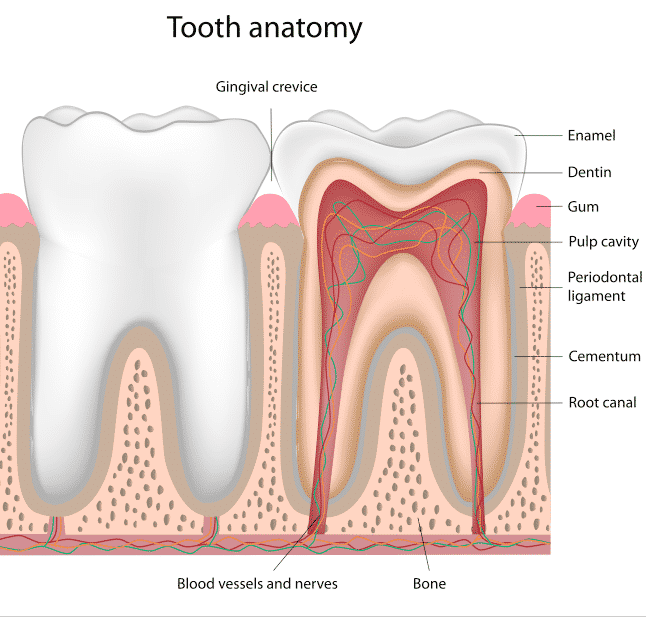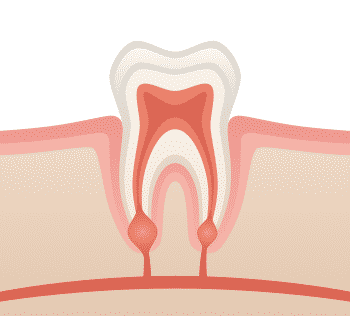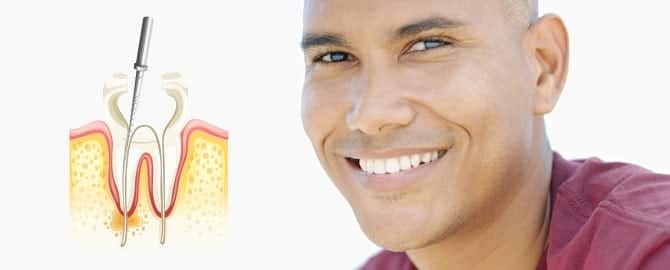Relax, a root canal isn’t as bad as you might have heard.
A root canal helps repair teeth that are so decayed they have become infected. Each tooth’s nerve and pulp reside in the root canal. When infected, the nerve and pulp need to be removed. After this, the tooth is cleaned and sealed.
Some of the symptoms of a tooth that might require a root canal are: toothache when pressure is applied to your teeth either when chewing or clenching; in ability to tolerate cold or hot temperature: the darkening of a tooth or swelling of the gums.
If you’re exhibiting any of these symptoms, please, don’t delay contacting us. Putting off will lead only to prolonged discomfort and often is more costly later on in both discomfort and dollars.

Our teeth have layers. The outer layer is the Enamel and we have spoken a lot about that part of the tooth. It’s the hard outer shell. Under the enamel is the Dentin layer which is made up of living cells that secrete a hard mineral substance (which becomes the enamel). Under the dentin layer is the Pulp Cavity where the pulp, nerves and blood vessels reside. It is the soft, living inner structure of the tooth. On the outside of the tooth, under the gum line around the roots of the tooth is a layer of connective tissue called Cementum. This tissue binds the roots of the tooth to the jawbone and gums. Finally, the Periodontal Ligament keeps the tooth tight against the jawbone. It is important to understand these layers in order to understand endodontic therapy.
When is Root Canal Therapy Considered the Right Treatment Option?

When a patient comes to their dentist with a toothache, a number of things are done to diagnose the problem. First an x-ray is taken to determine if there is any damage to the root of the tooth, if there is any decay that extends into the pulp or if there is an abscess infection. The dentist will do a limited exam on the specific problem tooth to determine what course of action best suits the tooth and the patient. If the dentist feels a root canal is the patients best course of action, due to severe decay or an infection, they will refer the patient to an endodontist to perform the root canal procedure.
The Root Canal Therapy Procedure
Once you are at the endodontist’s office and it is verified that you need endodontic therapy, the process begins. After numbing the patient a dental dam is fitted around the tooth to keep the tooth isolated, to keep saliva from interfering with the procedure and to keep the instruments and materials from being inhaled.
Upon placement of the dental dam, the endodontist starts working. First the endodontist will open up the tooth by drilling into the crown down towards the pulp chamber. The endodontist will try to limit the size of the hole drilled into the tooth so that it doesn’t affect the structure too much. After the tooth is opened and the pulp chamber is exposed, the endodontist uses a series of files–handheld needle-shaped instruments with tiny teeth wrapped around the head–to drill out the nerve from the root canal. The files start very thin and small and as the procedure progresses, so does the size of the file in order to widen the canals. The process of removing the infected tissue and debris from the root canal serves to facilitate greater penetration of an irrigation solution. Finally, after the tooth is opened up, the nerve is removed and the irrigation solution does its job, the endodontist will fill each of the root canals and the chamber with an inert material and seal the opening.
At the end of the procedure, the endodontist will discuss with you the final step of the root canal therapy- getting the crown for the tooth. Your provider will send a correspondence of the treatment to your general dentist and advise you to make the appointment within the following weeks.
As a Patient at Affiliated Dentists
Root Canals are typically referred out to an Endodontist as they are specialists and will take great care of you. Your crown work required post-root canal therapy can all be handled right here in office at Affiliated Dentists.
